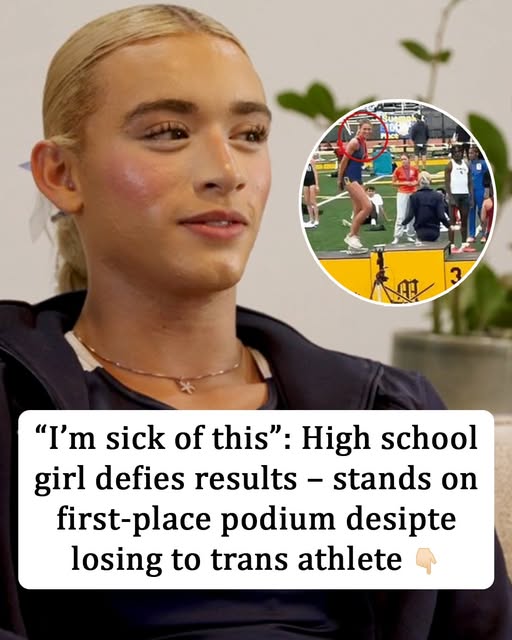
A stunning moment at a California high school track meet has set off a firestorm of controversy, reigniting the intense national debate over transgender athletes in women’s sports.
At the CIF Southern Section Finals on May 18, Crean Lutheran High School’s Reese Hogan made a bold statement—though she finished second in the triple jump, she climbed to the first-place podium after the ceremony and stood tall in the spot left empty by AB Hernandez, a transgender athlete born male who now competes as female.
The Growing Debate: Fairness or Inclusion?
The inclusion of transgender athletes in women’s sports has become a polarizing issue, tearing the country into opposing camps. Advocates argue that it’s about inclusion, identity, and basic human rights. On the other hand, critics believe it compromises the fairness and integrity of women’s competition.
This issue has expanded beyond sports, becoming a political flashpoint. Former President Donald Trump made waves earlier this year when he signed an executive order banning transgender women from competing in female sports divisions, declaring, “The war on women’s sports is over.”
This sparked heated debates, with some states like Maine refusing to enact similar bans, adding fuel to the fire.
A Moment That Went Viral
Hogan’s actions at the CIF Finals were captured on video and quickly went viral, drawing attention from across the nation. Despite finishing second in the triple jump with a jump of 37 feet, 5 inches, Hogan stood on the first-place podium after Hernandez, who posted a dominant jump of 41 feet, 4 inches, left the ceremony. Hernandez’s victory was undeniable, but for many, Hogan’s decision to claim the top spot was a symbolic protest.
AB Hernandez, from Jurupa Valley High School, also excelled in other events, winning the long jump and qualifying for the CIF Masters Meet. Her strong performances have sparked further discussion about fairness in women’s sports.
Reactions and Controversy
The internet quickly reacted. Jennifer Sey, founder of XX-XY, a women’s sports advocacy group, posted, “This guy won the girls long jump and triple jump in a CA track meet over the weekend. He won the triple jump by 8ft. He’s really crushing it!”
Others echoed similar sentiments: “Second place is the real champion!” and “Good on her! This nonsense has to stop.” A blunt sign at the meet read: “The weakest men compete with girls, the weakest minds celebrate it.”
This incident joins a long list of controversies regarding transgender athletes in women’s sports. In 2022, North Carolina passed legislation banning transgender athletes from competing in girls’ sports after a 17-year-old volleyball player suffered a traumatic brain injury from a transgender player’s spike.
However, not everyone agrees with such bans. Over 400 Olympic athletes recently signed a letter urging the NCAA to allow transgender athletes, calling it a matter of “being on the right side of history” and advocating for sports to be inclusive.
Hernandez Defends Herself
Despite the backlash, Hernandez has remained unapologetic. In a recent interview, she dismissed the criticism as “ridiculous,” asserting that she followed all the rules and that “trans girls are girls.”
She has also spoken out about the challenges of competing as a transgender athlete, acknowledging the mixed reactions she has faced throughout the season.
The Ongoing Debate
The debate surrounding transgender athletes in women’s sports is far from over. While studies show that transgender athletes may not consistently outperform cisgender athletes, the issue remains highly contentious.
Reese Hogan’s silent protest on the podium has brought the discussion back into the spotlight, ensuring that the battle for fairness in women’s sports will continue to rage on, louder than ever.